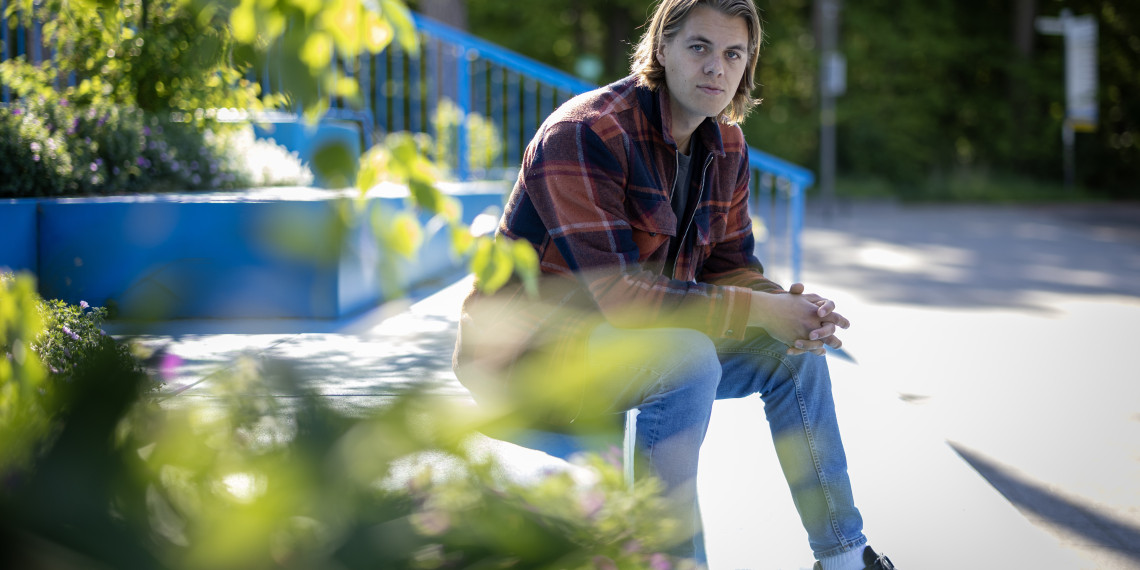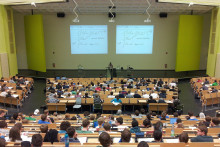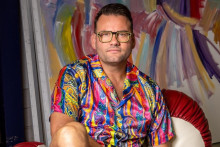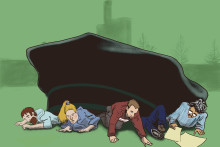Cas Last cheerfully swings open the front door of his home in the heart of Groningen. With his sun-drenched apartment in a nineteenth-century mansion, overlooking a canal, the master's student of Applied Physics seems to have successfully beaten the housing market lottery. But nothing could be further from the truth, he chuckles, as he leads the way to the first floor, where the house cat calmly parades around. 'It's an old and draughty building, we don't even have a bathroom.' He gestures to a door in the hallway: 'Our shower is in that cupboard.'
Three-part series: the UT students
U-Today had candid conversations with three UT students about their studies, student life, dreams, hopes, and ambitions. This provided a wonderful insight into how they view life. In the third part of this three-part series: Cas Last.
Last lives here with his girlfriend, but during the week he sleeps with his parents in Coevorden. From there it is only an hour's train ride to Enschede, instead of the two hours it would take him from Groningen. It’s not the most enjoyable, he confesses, but he only has to last another year. He will complete his master's programme this year. 'It was hard work to get to this point, but I'm so happy that it worked.'
Before he moored at Applied Physics in 2024, he spent seven years in four different fields of study. If he had followed his heart as an eighteen-year-old school-leaver, it would all have turned out very differently. The stars were aligned for a smooth study time: learning came easily to him from an early age. In primary school, he devoured books on astronomy. As a teenager, he climbed up the drainpipe after going out and lay on the roof of his house for hours looking at the stars. Towards the end of high school, he began to dream about studying physics, but he did not dare to apply. Insecurity and self-doubt had crept into his head, he says, as he puts a full teapot on the coffee table. 'I used to be closed, shy and insecure, I suffered from performance anxiety. I still have that at times, although I can deal with it better now.'
How did that feeling come into your life?
'It comes naturally. I need time to get used to people and I am very sensitive to social context.'
Did something happen in your social environment that made you more insecure or shy?
'Until I was four I lived in Koekange, a small village in Drenthe. My parents had a large farm that was no longer in operation. We had chickens and sheep, and I loved nature even then. I felt a little less at home in Coevorden. The original people of Coevorden are quite introvert. I made a lot of friends playing football, but there were also clumsy types walking around with weird worldviews. It was somewhat insular. My high school years were not always so carefree either. After the second year of gymnasium, I continued at the atheneum and ended up in a less pleasant class. I wasn’t a loudmouth, that made me an easy victim.'
Were you bullied?
'Well, not bullied, but sometimes things happened that weren't quite normal, sometimes it became physical. At that age, I was not able to say anything about it or draw a line. That time also played tricks on me later. In the meantime, schoolwork itself fascinated me less and less. In primary school I liked to learn, but in puberty came apathy. Learning came easily to me, it makes you a bit lazy. I thought: why should I do my best? I stayed in the third grade, I finished high school with great difficulty. It was like flogging a dead horse.'
Nevertheless, you immediately started studying biology in Groningen.
'My studies were a matter of randomness, because I didn't really know what I wanted. Actually, I wanted to do physics even then, but because of my insecurity and because I wasn't doing great at school, I doubted whether I could do it.'
What is the magic of physics for you now?
'That it is all-encompassing. Physics is a way of describing reality that also has something philosophical about it: why does something work in a certain way and what laws underlie it? When you see leaves blowing or the sun shining, you think: okay, this is behind it. That's so cool! You feel heat, wind, you learn how circulation and convection work, you constantly see all kinds of things happening around you that you can link to physics. I enjoy that.'
Anyway, you started studying biology. How did you like that?
'I really enjoyed it, but after six months it went completely wrong. I wasn't ready to live on my own. My first room was in the house of a grown guy who was already working and had a room to spare. I was 18 and barely knew how to cook or clean. Without my mother who could guide me, I enjoyed student life too much. I couldn't handle all that freedom at all. I didn't pass my exams, at one point I didn't show up at all. Halfway through the year I stopped and went back to live at home. The following year, I went on to study International Business Administration.'
Your heart suddenly beat for business?
Last laughs. 'What motivated that is still a mystery to me, because business operations have never interested me. But a friend of mine did it and he was enthusiastic about it. At the beginning of the second year, I already thought: if I have to do this all my life, I will be very unhappy. I didn't want to end up in such a job. But I finished it.'
Text continues below the picture.

'I considered doing a bachelor's degree in physics, but I didn't want to start from scratch again. Then I started doing a master's degree in Environmental & Energy Management in Twente. It was interesting, but still not what I wanted. I contacted the technical variant of that course - Sustainable Energy Technology. But with my background, they didn't think it was wise to let me in. It is a technical master's degree, most of the students there have already done Mechanical Engineering or Electrical Engineering. But I pushed a bit and was allowed to try anyway.'
While you just said that you are quite insecure.
'But if I set my mind to something, I go for it. I emailed the study advisor: what if I am already doing preparatory bachelor's courses and then start the pre-master's? That was allowed, and it went very well.'
Cheerful: 'The UT was very reasonable. Because last year I switched again, to a master's degree in Applied Physics.'
Why is engineering your ultimate field of study now?
'The great thing about applied physics is that you create technologies that can improve society and people's lives. Take a project like The Ocean Cleanup, which fishes plastic out of oceans and rivers. Or a technique such as CO2 capture, which allows you to attach CO2 to a certain material and literally remove CO2 from the air. That way you reduce the greenhouse effect.'
Last still has to finish a bachelor's course and then, together with the PhD student who supervises him, he will start his graduation project, on the so-called Quantum Spin Hall Effect. He jumps up and pulls out a notepad. Enthusiastically, he starts sketching a graph to explain the physical phenomenon: 'If you make certain materials thin enough, they get a kind of protected channels at the edge of that material, which ensures that they lose their energy less quickly.'
What can you do with it next?
'With the Quantum Spin Hall Effect you can transport electrons very efficiently, which saves energy. Wherever you need conductivity, this is advantageous. Our computers and phones are full of transistors. Now that artificial intelligence is becoming increasingly important, there are only more of them. If you can save some energy, it can have a huge impact, because AI takes a lot of energy.'
What would you like to do when you graduate?
'I think the energy transition is an important development, so perhaps something with hydrogen or solar energy. Nuclear fusion is also cool, that's basically how a star works. In a star, hydrogen atoms are fused, which produces energy. In the south of France, a machine is now being built that can control that process. They actually want to make a star on Earth, on a small scale. You could potentially get a lot of clean energy from that.' Beaming: 'That's cool. Research also appeals to me, maybe I want to do a PhD trajectory. I just really enjoy learning. Teaching also seems nice to me.'
Last is eager to get to work. 'Because of that switch – the bachelor's that was very different from what I'm doing now – I've been studying for a long time. I'm glad I did, but my girlfriend has been working for a few years, she puts the food on the table. It's a bit of a wait for me, until I start earning too. My friends are starting the next step in their lives, I want that too. I would like to move, and I feel like traveling. The world is bigger than Groningen and Enschede.'
Has the insecurity from your teenage years faded into the background now that you know what you want?
'I will always keep that uncertainty about what other people think of me, but that's fine, it also gives self-reflection. Getting clear what really interests me has given me peace of mind. When I sit next to fellow students who have been studying physics for four years, I think: I've just come to have a look. But I now know very well what I like and why. That's worth a lot.'
When you graduate, what will you take with you from your studies at the UT?
'I learned to work very hard and I also learned to work too hard. Last year I did a master's and a pre-master's at the same time, and now I'm at my limit. I don't want to call it a burnout, but I do have stress from being away from home a lot and traveling a lot. Last year I studied almost non-stop and got physical complaints. The stress has to come out, and if you don't give yourself space in it, it happens this way. I have to maintain the balance between work, study and relaxation and also do fun things next to my studies.'
In a corner of the living room there is a record player, leaning against a small desk an acoustic guitar and an electric guitar. 'During the Covid epidemic, I taught myself to play the guitar via YouTube. At the time, I lived in a room that was no more than a kind of cube with a side window, quite depressing. After a year and a half of lockdowns and sitting indoors, my world became very small, until my parents gave me a guitar for my birthday. I was playing the blues for hours. Music still gives me pleasure and comfort when I don't feel so well.'
But music alone is not enough to keep his life on track, Last notes. Soon he will talk to someone, in an attempt to get rid of his complaints. 'I think it's good if I get a little help to go out into the world, instead of everything going on in my head.'
'It's not just study stress. Social media and that constant flow of information don't do me any good either. Six months ago I went off all socials. I'm done with all that picture perfect on Instagram. All the misery in the world also makes me down. Trump is in the news a lot, that's awful, it stays in my head. It's frustrating that you're young and want to make an impact in the world, while there's an eighty-year-old guy in the White House who goes through everything like a wrecking ball. That makes you feel powerless.'
What bothers you the most when you look around you in the world?
'It is a very strange time, we are at a special point in history: the war in Europe, Israel. I have difficulty with the inward turning of countries, with that xenophobic scapegoat politics, as if migrants are the cause of all problems. It feels so antisocial, people are just stigmatised. I think the idea of ‘The Netherlands first’ is nonsensical. The importance of cooperation is forgotten. I notice that I am also quite busy with myself – I want to become this and do that. Sometimes I think: is that the right focus? We all have to do it together, don't we?'
Are you already doing something concrete for that?
'Not really. I would like to do something political or societal, but I don't know exactly what that should look like yet, I'm thinking about that now.'
The fact that the extreme right is on the rise in the Netherlands, do you also notice that on campus?
'Yes, with the recent round of layoffs at the UT, it comes close. We are going to the right politically and the money is going elsewhere. I found that painful to see, also the way in which it was done. My teacher for the instrumentation course was urged to come outside ten minutes after the start of his lecture. Then he said, I'll finish the lecture first. During the break they told him: listen, you've been fired. I think that's a pretty inhumane way of doing things. I understand that it has to be done, because there is a budget shortage due to political choices. But you do have an influence on the way you present it. I thought it was great that he still finished the hour. At the end he said: this is probably the last lecture I gave you.'
Do students talk about this among themselves?
'There is a lot of dissatisfaction among students about how things are going now. All those education cuts are focused on the short term, which many fellow students find incomprehensible and stupid. Even the NOS reported on all the layoffs. For the university, that's bad marketing. If you're a prospective student and you're considering Delft, Eindhoven and Twente, you may no longer choose Twente.'
Text continues below the pciture.

'Foreign students are anxious: if this continues, will I have to leave the Netherlands? Political choices actually affect people, and eventually we will all start to feel that. Many students are concerned about what the world will look like in thirty years or so. Then you are talking about climate change, biodiversity that is declining rapidly. The likelihood of war has been accelerated by Trump's attitude. I sometimes discuss with friends: suppose a NATO country is invaded, then there is now a real chance that we will be called upon.'
Would you be willing to fight in a European army?
'I am inclined to say 'yes' bravely.'
Far-right parties are attacking established institutions, from the government and the media to the judiciary and science.
'You can't be critical anymore. An anti-intellectual wind is blowing. You feel that there is a split between the university-educated people and the more practically educated people. You can clearly see that in the United States. Science is seen more as an opinion than as objective facts. This makes science ripe for political influence and you become undesirable if you do not fall in line, or do not draw the conclusions that political power expects. In America, you see that climate scientists are no longer allowed to talk to foreign scientists and are no longer allowed to attend the IPCC conferences in China. These are worrying developments.'
Could that affect your field?
'Certainly, climate science is a form of physics. The IPCC says that the probability that climate change is caused by humans is 99%. We have to do something about that now. But behavioural change takes effort and evokes resistance. I think that's why you're seeing that shift to the right now.'
Meanwhile, your study time also offers an opportunity to choose your own path in life. Do you feel the need to do things differently than, for example, your parents?
'I've been consciously working on that in recent years: what do I actually think myself? I decide that I want to make myself heard more, but that was not really given to me from home. My parents are both on the left. They think it's important to be social and have empathy for your fellow man, but they don't openly express that. My father in particular is a bit more reserved and conflict-avoidant, in that we are similar. But I think it's important, also because of all the problems in the world, to speak up if I really don't agree with something. Not because I expect to have such a huge influence. But I think that if enough people speak out, it does have an influence.'
Then an interview like this might also be tense?
'I had serious doubts about it, but told myself that I want to be less closed. This is a nice baptism by fire.'
How do you see the future?
'Still hopeful. You shouldn't lose yourself in the issues of the day, it's better to look at the long term. We are now making a move to the right, but I think those are cycles. We should not pretend that all is lost in the world. In four years, Trump will be gone again, and then it will turn out that his short-sighted solutions solve nothing. I believe that's the trick: being a bit stoic in the world, while keeping your eyes open for what's going on around you.'








